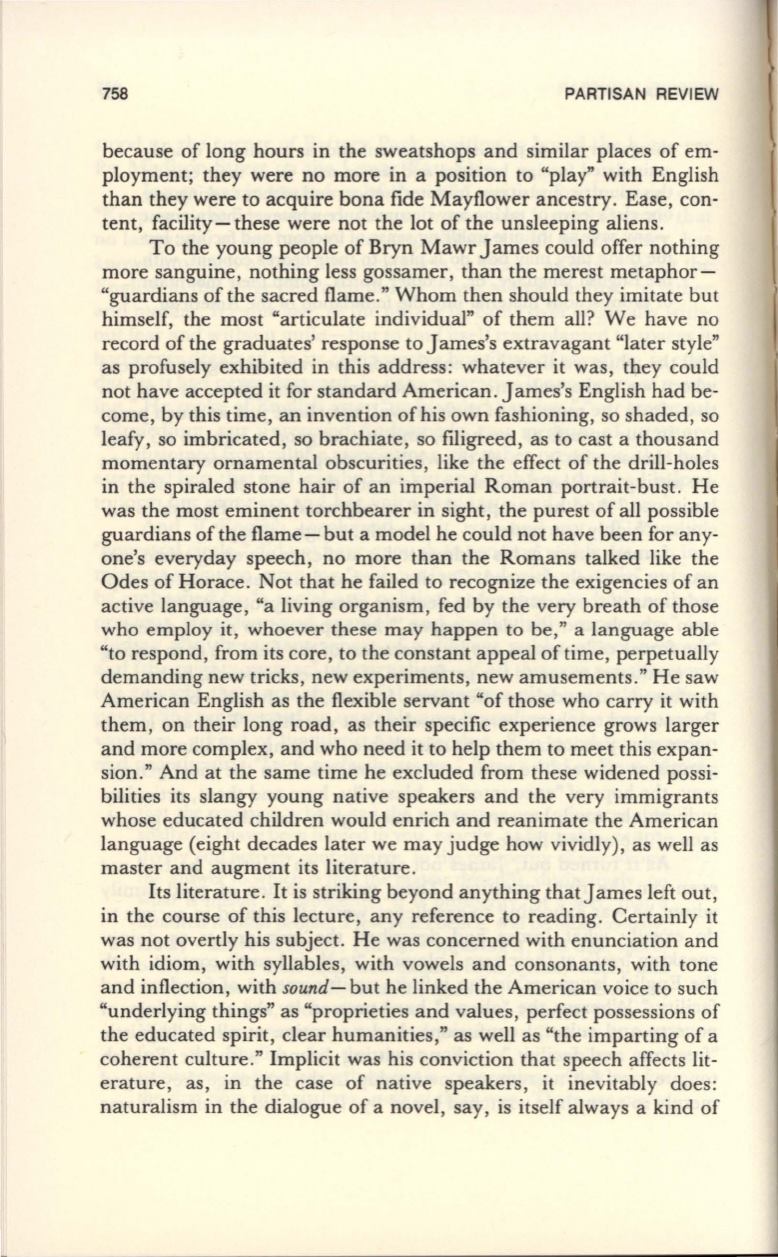
758
PARTISAN REVIEW
because of long hours in the sweatshops and similar places of em–
ployment; they were no more in a position to "play" with English
than they were to acquire bona fide Mayflower ancestry. Ease, con–
tent, facility- these were not the lot of the unsleeping aliens.
To the young people of Bryn Mawr James could offer nothing
more sanguine, nothing less gossamer, than the merest metaphor–
"guardians of the sacred flame ." Whom then should they imitate but
himself, the most "articulate individual" of them all? We have no
record of the graduates' response to James's extravagant "later style"
as profusely exhibited in this address: whatever it was, they could
not have accepted it for standard American. James's English had be–
come , by this time, an invention of his own fashioning, so shaded, so
leafy, so imbricated, so brachiate , so filigreed, as to cast a thousand
momentary ornamental obscurities, like the effect of the drill-holes
in the spiraled stone hair of an imperial Roman portrait-bust. He
was the most eminent torchbearer in sight, the purest of all possible
guardians of the flame- but a model he could not have been for any–
one's everyday speech, no more than the Romans talked like the
Odes of Horace . Not that he failed to recognize the exigencies of an
active language, "a living organism, fed by the very breath of those
who employ it, whoever these may happen to be," a language able
"to respond, from its core, to the constant appeal of time, perpetually
demanding new tricks, new experiments, new amusements ." He saw
American English as the flexible servant "of those who carry it with
them, on their long road, as their specific experience grows larger
and more complex, and who need it to help them to meet this expan–
sion." And at the same time he excluded from these widened possi–
bilities its slangy young native speakers and the very immigrants
whose educated children would enrich and reanimate the American
language (eight decades later we may judge how vividly), as well as
master and augment its literature .
Its literature . It is striking beyond anything that James left out,
in the course of this lecture, any reference to reading. Certainly it
was not overtly his subject. He was concerned with enunciation and
with idiom, with syllables, with vowels and consonants, with tone
and inflection, with
sound-
but he linked the American voice to such
"underlying things" as "proprieties and values, perfect possessions of
the educated spirit, clear humanities," as well as "the imparting of a
coherent culture." Implicit was his conviction that speech affects lit–
erature, as, in the case of native speakers, it inevitably does:
naturalism in the dialogue of a novel, say, is itself always a kind of


